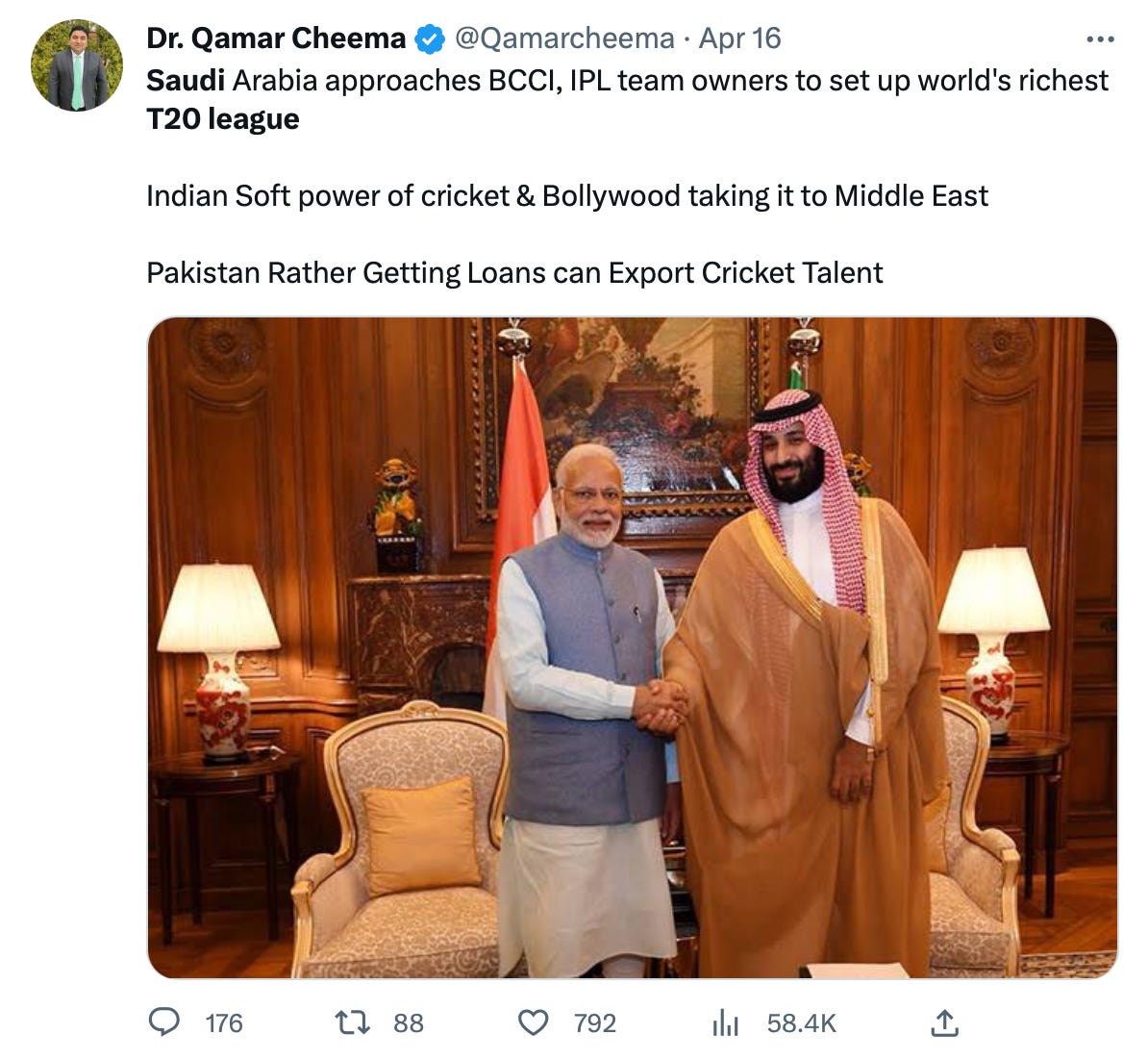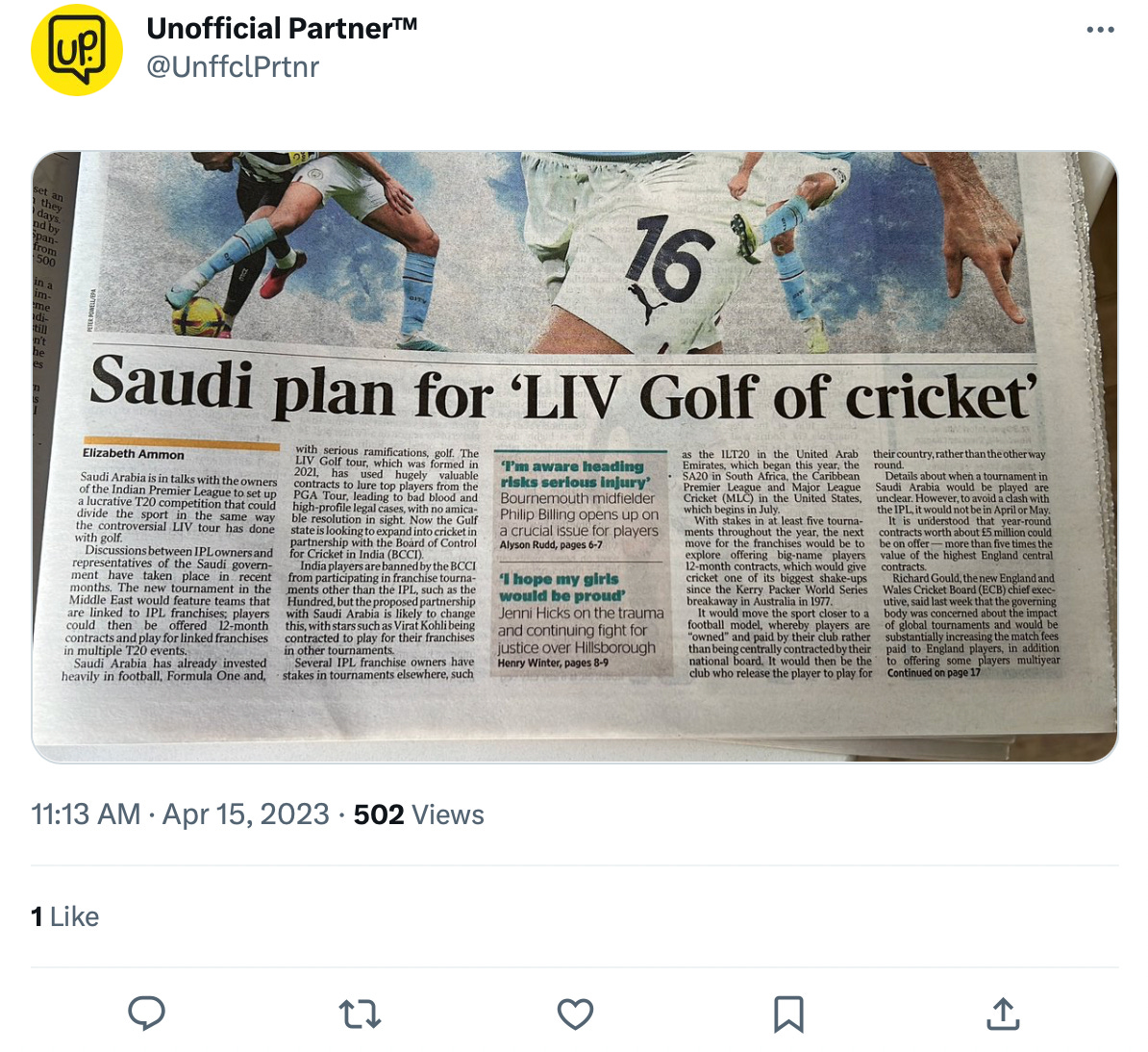Power Play: Saudi's T20 Investment Could Offer Greatest Upside Yet 🏏
With a popular format, known teams and a collective of high-profile players, if they can secure the BCCI's backing, Saudi Arabia's proposed T20 league has a chance to be their biggest sporting success
Not yet a subscriber? Join 1000+ sports business leaders, from the PFL to the Premier League, that read Sports Pundit every week to get impactful industry insights.
The Indian Premier League’s (IPL) has matured into one of the world's most valuable sporting properties over the last 16 years.
Its global media rights pacts on a per-match basis are second only to the NFL, and sponsors and investors alike are pouring money into the property.
The Kingdom of Saudi Arabia has taken note and is now reportedly looking to cash in by establishing its own Twenty20 tournament.
The Gulf State is seeking the support of IPL owners and the Board of Control for Cricket in India (BCCI), and just may receive it.
International Cricket Council (ICC) chairman Greg Barclay recently acknowledged that logically speaking, Saudi Arabia’s pursuit of cricket makes sense.
The Saudis have started to increase their investment in the sport over the last six months. The Saudi Tourism Authority signed a $7.24 million per year partnership with the IPL in February, and government-owned Aramco has inked sponsorship pacts with both the IPL and ICC.
The country also resides on the doorstep of major cricketing nations such as India, Pakistan, Bangladesh, and Sri Lanka, so there is a familiarity with the game, and its financial resources have the potential to make a new league meaningful within the global landscape.
Cricket insiders presume a Saudi T20 league would become the wealthiest of its kind from inception, leading some to call it the 'LIV Golf of cricket'.
However, that seems like a lazy comparison.
“There’s quite a few things that have happened with [LIV Golf] that you wouldn't expect to happen with this [league],” Amar Singh (SVP, content and communications, MKTG) said.
For starters, “They're not disrupting the current power structure in an 'us vs them' manner [as LIV has]," Singh said. "It sounds like they're trying to do this very much in partnership with the IPL and the BCCI because they understand how important bringing the Indian cricketers to the tournament will be."
As it stands, Indian cricketers are not permitted to play in overseas T20 tournaments.
But if the BCCI did change its stance on this issue for this proposed competition, Singh believes that it would quickly find a lucrative domestic TV partner.
"Having the Indian players, the media rights would pretty much sell themselves,” he asserted.
The Kingdom would not need to provide large scale buyouts to attract players, the way LIV or the Saudi Pro League (SPL) has, either. Cricket is unique in that the players are tied to their country, not a privately owned club, franchise, or league.
And outside of India, where participation is restricted, top talent is already participating in tournaments around the globe (provided it does not interfere with playing for their home country).
Essentially, every player is for-hire.
With players already participating across multiple tournaments around the world, a new cricket league would seem to be less disruptive to the sport's structure than its efforts to date in golf; and cricket fans are already familiar with –and proponents of– the T20 format.
Remember, LIV set out to introduce long-time golf fans to a new 54-hole team format.
Meanwhile, speculation exists that ongoing discussions with IPL owners could potentially lead to teams in the proposed new league leveraging powerful existing intellectual property.
For perspective, teams like Royal Challengers Bangalore and Chennai Super Kings are among the ten most engaged in all of sports on social media.
“It makes a lot of sense that these conversations are happening [with Saudi Arabia] because these IPL owners want to spread their wings," Singh said. "They’re making serious cash in India, but like any good entrepreneurs, they're asking what's next?"
Their expansion has already begun.
All six teams in South Africa's SA20 League are owned by IPL owners. IPL club owners have also bought three teams in UAE's ILT20 and made investments in both the Caribbean Premier League and Major League Cricket.
Crossover ownership can be helpful in attracting top players and a global cricket audience. It also appeals to the expatriate Indian population in emerging markets like the U.S., U.K. and Saudi Arabia.
And no country has more expatriates in the Kingdom than India (2.55 million).
Aligning with the IPL would, of course, give the Saudi's access to India's large population (1.4 billion) and fast growing economy too; something they have yet to tap into through their existing investments in sport.
With a popular format, known teams and a collective of high-profile players, if the Saudis can secure the backing of the BCCI, this proposed T20 league would have a chance to almost instantly own a significant piece of the second most popular sport in the world.
That upside is greater than anything we've seen from gulf state sports investment to date.
RECOMMENDATION
JOB BOARD
Partnership Sales Manager - Brentford FC (London, UK)
Partnership Design Assistant - Liverpool FC (London, UK)
Director, International Content EMEA - PGA TOUR (London, UK)
Senior Project Manager - Manchester United (Manchester, UK)
Director, Strategic & Digital Communications - MLS (New York, US)
Vice President, Partnerships - 160over90 (New York, US)
Director, Strategic Planning, Colorado Rapids - Kroenke Sports & Entertainment (Colorado, US)
Do you have a job you’d like to promote to the amazing readers of this newsletter?Drop me a note at andy@sportspundit.org
Not yet a subscriber? Join 1000+ sports business leaders, from the PFL to Premier League, that read Sports Pundit every week to get impactful industry insights.












Do you know if this investment will crossover to the women’s side of the sport too?